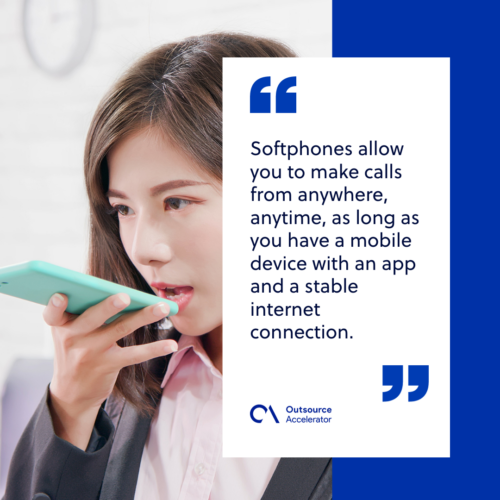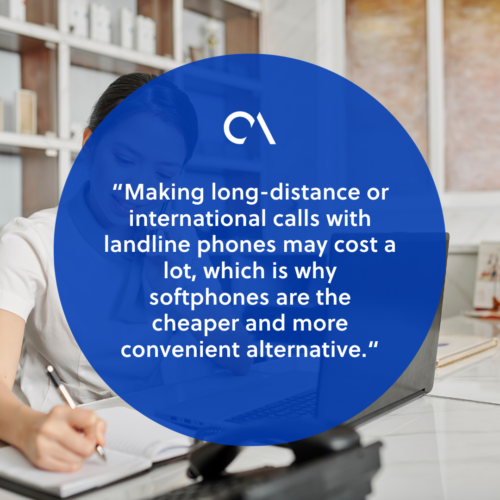Advantages and disadvantages of using a softphone

While businesses back then relied on landlines and desk phones, the rise of the internet made it possible to make calls using a computer or smartphone, also known as a softphone.
Continue reading to learn more about how a softphone works and its advantages and disadvantages.
What is a softphone?
Softphone is a telephony software you install onto a computer, laptop, or tablet to make a call using the internet.
Softphones allow you to make calls from anywhere, anytime, as long as you have a mobile device with an app and a stable internet connection.
While traditional telephones can only stay in one place and use landline connections, softphone technology turns your device into a working telephone you can take on the go.
To get it to work, you will need a stable internet connection. It uses Voice over Internet Processing (VoIP) technology to transmit and receive audio into your device’s microphone or speakers.

Softphone vs. Hardphone
Softphones and hardphones are similar because they allow you to call other people.
The only difference is that a softphone is used via an app or software instead of physical hardware telephones.
Softphones are more mobile-friendly than hardphones. They are also integrated with other types of software and applications, while hardphones are limited to hardware.
How does a softphone work?
Softphones essentially work the same as regular telephones. You dial a number on the software or app on your mobile device and wait for the other person to pick up.
The only difference is you are dialing on a virtual keypad instead of a physical one. Once the app is installed, you will need a headset, microphone, and speaker to make calls.
Just like a regular phone, your softphone provider allows you to use a real phone number and one with an area code if needed.
While physical telephones have a PBX box installed, softphones use a cloud-based one that requires an internet connection.
Advantages of a softphone
Softphones come with several advantages that hardphone users do not have.
Increased mobility
You can install softphone apps on your mobile phone or tablet and take calls from anywhere, compared to a physical telephone that can only stay in one place.
This increased mobility allows you to take important calls despite not being in the office or in your workstation.
Cost-efficient
Making long-distance or international calls with landline phones may cost a lot, which is why softphones are the cheaper and more convenient alternative.
As long as you have an internet connection, you can make and receive calls from anywhere without much cost.

Integration with other software
Softphones are run on software. It allows for more functionality that hardphones cannot provide, such as call recording, video calling, and instant messaging.
Scalability
Compared to traditional phones, softphones allow users to scale up or down, depending on what is needed. Businesses can add or remove users, features, and phone lines as they see fit.
Disadvantages of a softphone
While softphones provide several advantages, there are potential downsides as well.
Constant need for an internet connection
Softphones require an internet connection to work, and there may be times when the internet is not always available.
Power outages or going to a location with poor internet or no internet will prevent a softphone user from making calls.
Power dependency
Softphone software also drains the battery of your mobile devices, meaning you will have to charge frequently, which could be a hassle.
If you do not have access to your charger or a power outlet, your device will run out of battery, which could happen during an important call.
How to choose the right softphone provider
There are numerous softphone providers, each with their own unique features. Listed below are some considerations when choosing the right provider:
Sufficient phone lines
You want a softphone provider that can accommodate a high call volume and still maintain clear audio quality.
Think about how many lines you will need with the idea of eventually scaling up or down in the future.
High-security standards
Keeping your conversations with your contacts private is very important, so it is best to choose a provider with robust security measures to keep this data protected.
This is especially important if you are working in industries like healthcare or insurance, which would require an HIPAA-compliant provider.
Good customer support
If phone lines are down or an issue with one of the features arises, you will need reliable customer support to help navigate around those problems.
Some providers only offer US-only customers, while others don’t have customer support unless you pay for the highest tier. Thoroughly research the different providers to see which offers the best customer support.
Pricing
Despite being more cost-effective than hardphones, softphone providers may require you to pay extra for additional features.
Consider your needs before choosing a pricing plan that will give you the best experience possible.
International coverage
This is important for those who have international clients or partners and need to contact them from wherever and whenever.
Check if your provider offers sufficient international coverage and good audio quality.
Installing a softphone
Installing a softphone only takes a few minutes, and before you know it, you now have a working telephone that you can take anywhere.
You don’t have to limit yourself to taking calls in one place. Plus, you can take advantage of the additional features to make communication so much easier.







 Independent
Independent




